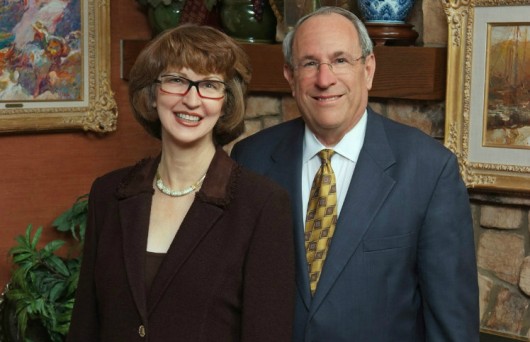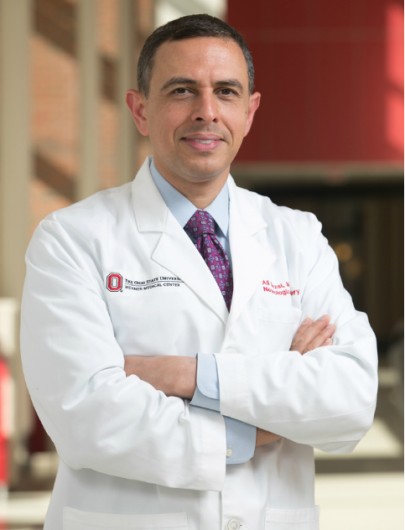
Stanley and Joan Ross gifted OSU $10 million dollars, establishing the Stanley D. and Joan H. Ross Center for Brain Health and Performance. Credit: Courtesy of OSU.
Stanley Ross, a 1962 Ohio State graduate, likes excitement. His office stands as a testament to this, with walls covered with images of race cars. In some, Ross sits behind the wheel. In others, he stands beside famous drivers, such as Danika Patrick.
Ross’s love of excitement played a role in his decision to donate $10 million to found the Stanley D. and Joan H. Ross Center for Brain Health and Performance.
“This can affect millions of people over generations, it’s exciting, that’s why, in a nutshell,” Ross said of his decision to support the center.
The OSU Board of Trustees accepted the pledge from Stanley and Joan Ross and approved the naming of the Center for Brain Health and Performance during a July 5 meeting.
Ross’ motivation to donate to the center grew from an accident, which struck close to home for his family. His son, Malcolm, was in an accident at the Indianapolis Raceway in 1993. Malcolm, who had entered the race instead of attending his high school graduation, was severely injured and broke his neck.
He ended up going through rehabilitation at OSU’s Dodd Hall rehabilitation hospital.
Malcolm recovered from his injuries, but watching Malcolm’s recovery inspired Ross’s interest in improving neurological medicine.
“Life has a way of changing outlooks,” he said.
As he learned more about neurological medicine, Ross found that many exciting things were happening in the field.
“It’s magic, the stuff that they’re doing and continuing to find,” he said.

Dr. Ali Rezai, director of the neuroscience program, has been an advocate for the creation of the Center for Brain Health and Performance. Credit: Courtesy of OSU.
One of the men behind the “magic” of neuroscience is OSU’s Dr. Ali Rezai, a neurosurgeon who is leading the effort to create the center.
When Stanley and his wife, Joan, heard Dr. Rezai’s plans for the center, “it struck us as an opportunity to get OSU in on the ground floor with something that’s new, that’s exciting,” Ross said.
Rezai said the center will make OSU “a leading authority on brain health and performance.”
Part of the center’s mission will be to promote population brain health, which means promoting brain health for people who are not necessarily ill or injured. This approach is set apart from strictly focusing on the care of sick or injured patients at neurological centers.
“We need to look at the health of the brain in the same way we look at the health of the heart,” Rezai said.
He added that he feels this approach is important to learn how best to care for the brain before it is injured or diseased.
“Our goal is to look at not only patients, but brain health and performance for the general population,” he said.
The brain health and performance is important for the general population because “everything you do day to day requires what we call a neural capacity,” Rezai said.
The center will perform neurological research, treat patients, provide educational programs and, over time, develop assessments which will allow anyone to come in to have their overall brain health and performance evaluated.
The center has involved many collaborations across the university, the country and even the world. Rezai expects such collaboration to continue through the recruitment of neurological leaders from around the globe, the hosting of an annual neurological summit and the creation of an incubator to support neurological research.
Rezai said he believes that Ross’s gift will allow the center to become the “premier go to place for brain health and performance.”
And Rezai said he is looking forward to working toward this goal.
“It’s an exciting time for us,” he said.


